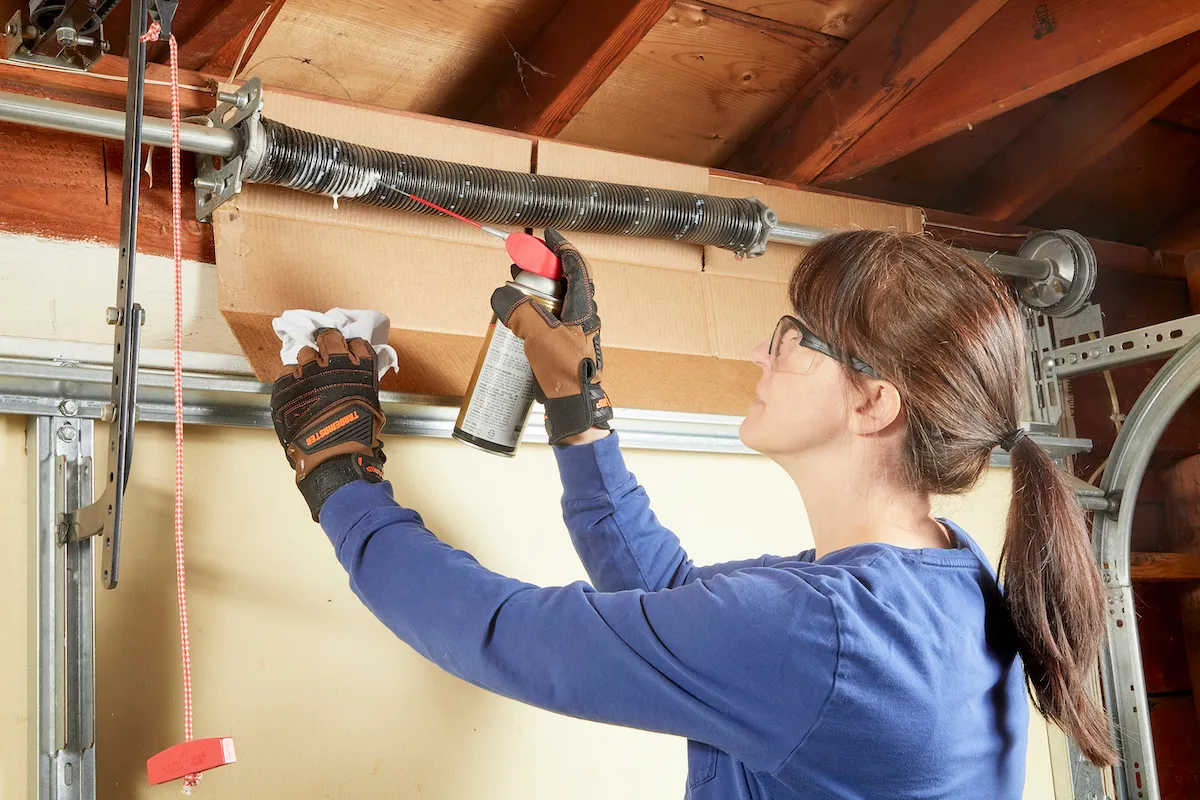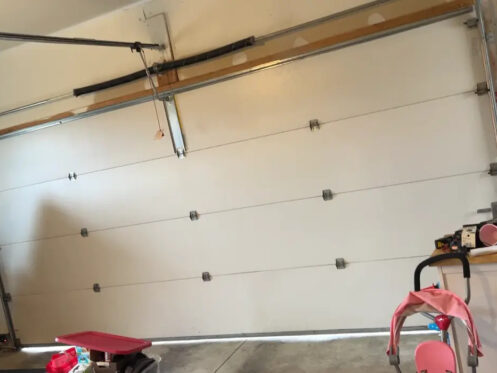Is your garage door waking the family at 6 AM? That grinding, squealing, or rattling noise isn’t just annoying it signals that something needs attention. The good news? Most noisy garage doors can be fixed quickly with simple maintenance you can do yourself.
This guide reveals exactly why your garage door is loud and walks you through proven solutions that deliver immediate results. From quick 5-minute fixes to knowing when you need expert garage door repair, we’ll help you restore peace and quiet.
Why Is Your Garage Door Making So Much Noise?
Understanding the source of rattle helps you fix it faster. Here are the most common culprits behind a loud garage door:
Worn-Out Rollers Creating Grinding Sounds
Rollers guide your door up and down the tracks. After years of use, metal rollers wear down and develop flat spots, causing grinding rattle with every movement. Steel rollers are particularly loud compared to nylon alternatives.
Dried-Out Moving Parts Need Lubrication
Garage doors have multiple pivot pointshinges, rollers, springs, and tracks. Without proper lubrication, metal-on-metal friction creates squealing and scraping sounds that echo through your home.
Loose Hardware Causing Rattling
Constant vibration from daily use loosens bolts, nuts, and screws throughout the door assembly. These loose components rattle and bang as the door operates, amplifying the overall noise level.
Misaligned Tracks Creating Friction
When tracks shift out of alignment, rollers don’t glide smoothly they scrape and bind against the metal. This misalignment increases friction and produces loud grinding noises during operation.
Aging Garage Door Opener Motors
Older chain-drive openers are notoriously loud. As the motor and internal gears age, mechanical wear creates additional rattle. The vibrating chain itself transmits sound directly into your home’s structure.

7 Proven Ways to Make Your Garage Door Quieter
1. Lubricate All Moving Parts (Do This First)
Lubrication is the fastest, easiest way to reduce garage door rattle. Proper lubrication eliminates friction and can cut rattle levels by 50% or more in just minutes. Read more about lubricate the door.
What you’ll need: Silicone-based garage door lubricant or lithium grease spray
How to do it:
- Apply lubricant to all rollers (where they meet the track)
- Spray hinges at all pivot points
- Lubricate the springs lightly (avoid over-saturating)
- Apply lubricant to the track where rollers make contact
- Wipe away excess with a clean cloth
Pro tip: Never use WD-40 it’s a solvent, not a lubricant, and attracts dirt that makes noise worse over time.
Expected result: Immediate noise reduction of squealing and grinding sounds
2. Replace Old Metal Rollers with Nylon Rollers
Metal rollers are the loudest component on most garage doors. Upgrading to nylon rollers with sealed ball bearings dramatically reduces noise and requires less maintenance. Read more about Replacing the rollers.
How to do it:
- Purchase nylon rollers with ball bearings (10-13 per door typically)
- Remove one roller at a time from the track
- Unbolt the bracket, slide out the old roller, install the new one
- Never remove the bottom rollerleave this for experienced due to spring tension
Expected result: Up to 75% noise reduction, especially grinding sounds
When to call for garage door repair: If you’re uncomfortable working around spring tension or removing door sections, experienced can complete this upgrade safely in under an hour.
3. Tighten All Loose Hardware
Vibration loosens bolts throughout your garage door system. A complete hardware check takes 15 minutes and eliminates rattling noises.
What you’ll need: Socket wrench set or adjustable wrench
How to do it:
- Sighten bolts on all track brackets
- Secure hinge bolts on each door section
- Secure roller brackets
- Check and tighten opener mounting bolts
- Don’t overtighten snug is sufficient
Pro tip: Check hardware every 6 months as part of routine maintenance.
Expected result: Eliminates rattling, reduces overall vibration noise
4. Realign Misaligned Tracks
Tracks that aren’t perfectly vertical and parallel create binding and loud scraping noises as rollers struggle to move smoothly.
How to check alignment:
- Use a level against each track to verify they’re perfectly vertical
- Measure the distance between tracks at multiple pointsit should be identical
- Look for gaps between rollers and tracks
How to fix it:
- Loosen track mounting brackets slightly
- Gently tap tracks into proper alignment with a rubber mallet
- Retighten brackets once aligned
- Test door operation
When to call for garage door repair: If tracks are severely bent or damaged, replacement is safer than attempted repairs.
Expected result: Smoother operation, reduced grinding and scraping
5. Upgrade to a Belt-Drive Garage Door Opener
If your opener is the noise source, upgrading makes a dramatic difference. Modern belt-drive openers operate whisper-quiet compared to chain-drive models.
Noise comparison:
- Chain-drive openers: 75-85 decibels (lawnmower level)
- Belt-drive openers: 50-60 decibels (normal conversation level)
Best for: Homes with living space above or adjacent to the garage
Professional installation recommended: Opener installation involves electrical work and precise tension adjustments.
Expected result: 80% noise reduction from the opener mechanism
6. Install Vibration Isolators and Rubber Buffers
Even after addressing mechanical issues, vibration transmits noise through your home’s structure. Sound-dampening solutions absorb this vibration.
Effective options:
- Vibration isolator pads: Place under opener motor mounts
- Rubber anti-vibration pads: Install between door sections
- Weatherstripping: Add along door edges to reduce rattling
- Bottom rubber seal: Creates a cushioned close
How to install:
- Attach isolator pads between opener and ceiling mount
- Replace worn weatherstripping around door perimeter
- Install new bottom seal if current one is cracked or missing
Expected result: 30-40% reduction in transmitted noise, especially in adjacent rooms
7. Inspect and Maintain Garage Door Springs
Worn springs create noise and affect door balance. Springs under high tension shouldn’t be adjusted by homeowners; this requires expertise.
Warning signs:
- Loud creaking during operation
- Door struggles to open or close smoothly
- Visible gaps or separation in spring coils
Garage door springs store tremendous tensionaround 200 pounds of force. Improper handling causes serious injury. Experienced garage door repair technicians have specialized tools to safely inspect, adjust, or replace springs.
Expected result: Quieter operation, improved door balance, extended system lifespan.

When DIY Isn’t Enough: Professional Garage Door Repair
Some noise issues require expert diagnosis and repair:
Call a professional if:
- Noise persists after trying all basic solutions
- You notice bent or damaged tracks
- Springs show visible wear or damage
- The door operates unevenly or binding occurs
- Opener makes unusual grinding or clicking sounds
- You’re uncomfortable performing any repair
They have specialized tools for spring adjustments, track alignment, and opener calibration that ensure safe, long-lasting repairs.
Preventing Future Garage Door Noise
Maintenance prevents noise from returning:
Every 6 months:
- Lubricate all moving parts
- Clean tracks and remove debris
- Test door balance
Annually:
- Inspect rollers for wear
- Check weatherstripping condition
- Test opener auto-reverse function
For frequently used doors (10+ cycles daily):
- Increase maintenance frequency to quarterly
- Monitor for unusual sounds that indicate developing problems
- Address small issues before they become major repairs
Regular maintenance extends your garage door’s lifespan to 20-30 years and keeps operation whisper-quiet.
Quick Reference: Noise Type and Solution
Squealing or squeaking: Needs lubrication (5-minute fix)
Grinding sounds: Worn rollers replaced with nylon (1-hour DIY or 30-minute professional job)
Rattling: Loose hardware tighten all bolts and brackets (15-minute fix)
Scraping or binding: Misaligned tracks realign or call professional (30-minute to 1-hour fix)
Loud motor operation: Aging opener upgrade to belt-drive model
Banging on close: Worn bottom seal or stopreplace weatherstripping (10-minute fix)
Frequently Asked Questions
1. How often should I lubricate my garage door?
Lubricate every 6 months for typical use. If your door operates 10+ times daily or you live in extreme climates, lubricate quarterly. Always use silicone-based or lithium grease lubricants, never WD-40.
2. Can I replace garage door rollers myself?
Yes, for all rollers except the bottom ones on each sidethose are under spring tension and require professional tools. Replacing the remaining rollers takes 30-60 minutes with basic tools.
3. Why is my garage door still loud after lubrication?
Persistent noise after lubrication indicates worn rollers, misaligned tracks, loose hardware, or opener issues. Try tightening all bolts next. If noise continues, the problem likely requires part replacement or professional diagnosis.
4. Will nylon rollers really make a difference?
Absolutely. Nylon rollers reduce noise by 70-80% compared to metal rollers. They’re one of the most effective single upgrades for a quieter garage door and require less frequent lubrication.
5. Is a noisy garage door dangerous?
Not always, but noise often signals worn components that could fail. Grinding noises from worn rollers can lead to track damage. Loud spring sounds may indicate imminent spring failure. Address noise promptly to prevent more serious issues.
6. Should I upgrade my chain-drive opener?
If noise bothers you and your garage shares walls with living spaces, upgrading to a belt-drive opener makes a dramatic difference. Modern belt-drive openers are 80% quieter than chain-drive models and offer smoother operation.
Get Peace and Quiet Back Starting Today
A noisy garage door isn’t something you have to live with. Most noise issues resolve quickly with simple maintenance lubrication, tightening hardware, and replacing worn rollers address the majority of problems homeowners face.
Start with the easiest solutions first: lubricate all moving parts and tighten loose bolts. These two steps alone often reduce noise by 50% or more in just 20 minutes of work.
For persistent noise or issues you’re uncomfortable handling, experienced garage door repair services provide expert diagnosis and safe repairs. They’ll identify underlying problems, use specialized tools for spring work and precise adjustments, and get your door operating quietly again.
Don’t let a loud garage door disrupt your household or annoy neighbors any longer. Take action today and enjoy the quiet operation your garage door was designed to deliver.

